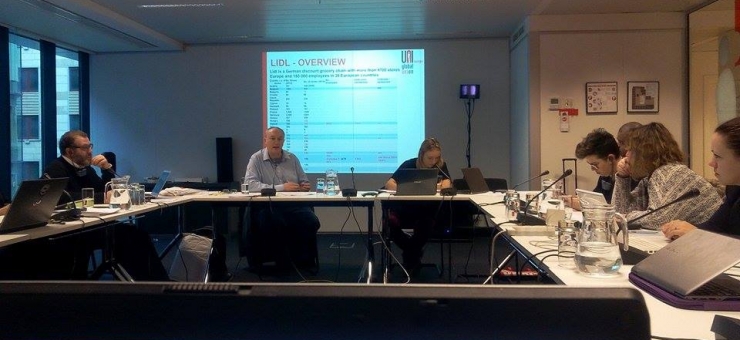Knowledge is power: 2nd Lidl trade union network meeting

20 trade unions officials and activists from 9 countries gathered on 20 January in Brussels to exchange their experiences in organising workers in Lidl.
Lidl is growing at a rapid pace, increasing its market share in the grocery trade and putting pressure on competitors with a double digit sales increase almost everywhere in Europe.
When it comes to social dialogue and trade union density, the picture is quite diverse across Europe. The German based company’s attitude towards unions is hostile to social dialogue, reflecting in particular the political framework.
In a first group of countries such as Spain, Sweden and Belgium, a collective agreement covers workers in Lidl, trade union membership is relatively high and trade unions have a tradition of dialogue with the company.
In a second group which comprises Italy and Netherlands workers enjoy fair working conditions and recent successful organising campaigns and bargaining rounds solved some of the main workers’ issues (in particular related to Health & Safety and working on Sundays).
A third group of countries however are struggling to get union recognition and access to the workplace. These countries are Ireland, UK, Poland and Hungary. However, a successful recruitment campaign started in 2014 in the UK is bearing its fruits as more and more workers are joining the commerce trade union USDAW.
Organising campaigns have aimed at hitting the company’s reputation by increasing customers’ awareness of Lidl anti-trade union behaviour and the benefit of joining a union.
Workers at Lidl, similar to other companies in the sector, are mainly young, work part-time, and do not stay long in the company. An increasing workload, the demand to multitask more and more, and Health & Safety issues are the main concerns. The Dutch Union, FNV, thanks to a successful campaign and the comparative mapping of production process managed to address some of the main workers’ problems related to the carrying of heavy and high pallets and as a result, increased trade union membership by 10 per cent.
Trade unions participating in the meeting committed to increase the sharing of information, facilitate the organisation of bilateral exchanges between countries and increasing efforts aimed at raising unionisation in the company in countries with little trade union representation.

